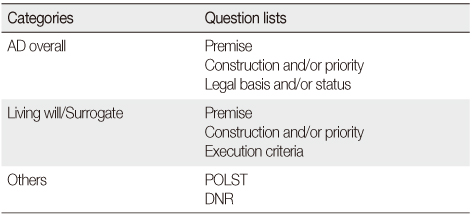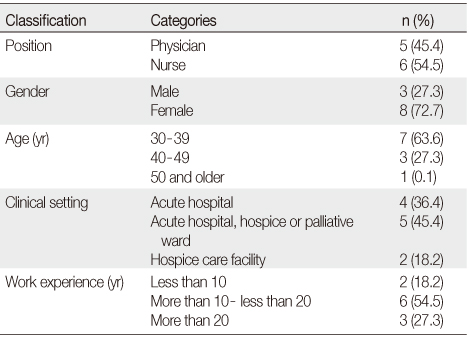Articles
- Page Path
- HOME > J Korean Acad Nurs > Volume 42(4); 2012 > Article
-
Original Article
- Prerequisite for Korean Advance Directives: From the View of Healthcare Providers
- Shin Mi Kim, Sun Woo Hong, Young Eun, Su Jin Koh
-
Journal of Korean Academy of Nursing 2012;42(4):486-495.
DOI: https://doi.org/10.4040/jkan.2012.42.4.486
Published online: August 31, 2012
1Department of Nursing, Changwon National University, Changwon, Korea.
2Department of Emergency Medical Technology, Daejeon University, Daejeon, Korea.
3College of Nursing, Institute of Health Sciences, Gyeongsang National University, Jinjoo, Korea.
4Oncology, Good Samaritan Hospital, Pohang, Korea.
- Address reprint requests to: Hong, Sun Woo. Department of Emergency Medical Technology, Daejeon University, 62 Daehak-ro, Dong-gu, Daejeon 300-716, Korea. Tel: +82-42-280-2938, Fax: +82-42-280-2946, swhong@dju.kr
© 2012 Korean Society of Nursing Science
- 1,119 Views
- 0 Download
- 16 Crossref
Abstract
-
Purpose
- The purpose of this study was to explore the main prerequisite for Korean Advance Directives [KAD] to ensure their better use.
-
Methods
- Data were collected from two focus group interviews and individual email responses. Study participants were 5 doctors and 6 nurses. All interview data were transcribed and analyzed using qualitative content analysis.
-
Results
- Three main themes emerged; establishing a philosophy of KAD, protocol to practice KAD, and the KAD document itself. A philosophy is needed to ensure individual needs, consensus to practice AD and identify principle agents. The core of protocol was found to be as follows; 1) process, 2) premise, 3) procedure, 4) contextual preparation, 5) timing, 6) feasibility. Component and feasibility need to be established for the document itself.
-
Conclusion
- For a positive acceptance of KAD in Korean society, a culture sensitive, reality based, and user friendly AD needs to be developed.
This work was supported by the National Research Foundation of Korea (NRF) grant funded by the Korea government (2010-0021379).
- 1. Fagerlin A, Schneider CE. Enough. The failure of the living will. The Hastings Center Report. 2004;34(2):30–42.ArticlePubMed
- 2. Hahn ME. Advance directives and patient physician communication. Journal of the American Medical Association. 2003;289:96. http://dx.doi.org/10.1001/jama.289.1.96.ArticlePubMed
- 3. Haisfield ME, McGuire DB, Krumm S, Shore AD, Zabora J, Rubin HR. Patients' and healthcare providers' opinions regarding advance directives. Oncology Nursing Forum. 1994;21:1179–1187.PubMed
- 4. Hsieh H, Shannon SE. Three approaches to qualitative content analysis. Qualitative Health Research. 2005;15:1277–1288. http://dx.doi.org/10.1177/1049732305276687.ArticlePubMedPDF
- 5. Heo DS. Patient autonomy and advance directives in Korea. Journal of the Korean Medical Association. 2009;52:865–870. http://dx.doi.org/10.5124/jkma.2009.52.9.865.Article
- 6. Kim KW. National movement to complete advance directives-Starts as civil movement. Yonhap News Agency. 2010;12 15 Retrieved November 11, 2011. from http://www.yonhapnews.co.kr/bulletin/2010/12/14/0200000000AKR20101214203900017.HTML?did=1179m.
- 7. Kim S, Lee Y, Kim S. Attributes considered important for a good death among elderly and adults. Journal of the Korea Gerontological Society. 2003;23:95–110.
- 8. Kim SY. The right for natural death at the end-of-life bill. 2009;Retrieved October 15, 2011. from http://www.ksy.or.kr/bbs/viewbody.php?code=policyActive&page=4&id=32&number=32&keyfield=&keyword=&category=&BoardType=&admin=.
- 9. Kim SM. Advance directives and proxy decision-making. Korean Journal of Medical Ethics. 2010;13:29–42.ArticlePDF
- 10. Kirschner KL. When written advance directives are not enough. Clinics in Geriatric Medicine. 2005;21:193–209. http://dx.doi.org/10.1016/j.cger.2004.08.006.Article
- 11. Kwon I, Koh Y, Ho YY, Heo DS, Seo SY, Kim H, et al. A study of the attitudes of patients, family members, and physicians toward withdrawal of medical treatment for terminal patients in Korea. Korean Journal of Medical Ethics. 2010;13:1–16.
- 12. Levi BH, Green MJ. Too soon to give up: Re-examining the value of advance directives. The American Journal of Bioethics. 2010;10(4):3–22. http://dx.doi.org/10.1080/15265161003599691.Article
- 13. Lo B, Steinbrook R. Resuscitating advance directives. Archives of Internal Medicine. 2004;164(14):1501–1506. http://dx.doi.org/10.1001/archinte.164.14.1501.Article
- 14. Ministry of Health & Welfare. Press release: Consensus report on withdrawing life-sustaining-treatment of a consultative body for social consensus. 2010;07 14 Retrieved November 1, 2011. from http://www.mw.go.kr/front/al/sal0301vw.jsp?PAR_MENU_ID=04&MENU_ID=0403&BOARD_ID=140&BOARD_FLAG=00&CONT_SEQ=238554&page=1.
- 15. Oh D, Kim J, Lee C, Lim J, Jung K, Heo DS, et al. Discrepancies among patients, family members, and physicians in Korea in terms of values regarding the withholding of treatment from patients with terminal malignancies. Cancer. 2004;100:1961–1966. http://dx.doi.org/10.1002/cncr.20184.ArticlePubMed
- 16. Park HW. The implications and significance of the case at Severance Hospital. Journal of the Korean Medical Association. 2009;52:848–855. http://dx.doi.org/10.5124/jkma.2009.52.9.848.Article
- 17. Koch KA. Patient self-determination act. The Journal of Florida Medical Association. 1992;79:240–243.
- 18. Prendergast TJ. Advance care planning: Pitfalls, progress, promise. Critical Care Medicine. 2001;29:2 Suppl. N34–N39.ArticlePubMed
- 19. Ramsaroop SD, Reid MC, Adelman RD. Completing an advance directive in the primary care setting: What do we need for success? Journal of the American Geriatric Society. 2007;55:277–283. http://dx.doi.org/10.1111/j.1532-5415.2007.01065.x.Article
- 20. Rao JK, Alongi J, Anderson LA, Jenkins L, Stokes G, Kane M. Development of public health priorities for end-of-life initiatives. American Journal of Preventive Medicine. 2005;29:453–460. http://dx.doi.org/10.1016/j.amepre.2005.08.014.ArticlePubMed
- 21. Sabatino CP. Advance directives and advance care planning: Legal and policy issues. 2007;Washington, D.C, U.S. Department of Health and Human Services.
- 22. Sandelowski M. The problem of rigor in qualitative research. Advances in Nursing Science. 1986;8(3):27–37.ArticlePubMed
- 23. Seymour J, Gott M, Bellamy G, Ahmedzai SH, Clark D. Planning for the end of life: The views of older people about advance care statements. Social Science and Medicine. 2004;59:57–68.ArticlePubMed
- 24. Shin SJ, Joo SY, Yim DG, Kim ST, Ahn SS, Lee HS, et al. Dying with dignity law. 2009;Retrieved November 11, 2011. from http://www.ssj.or.kr/02_political/index.php?bbs_id=agreement2&num=935&page=6&key=&keyword=&btype=&mode=view.
- 25. Statistics Korea. Death for 19 chapters of causes by place of death. 2009;Retrieved October 11, 2011. from http://kostat.go.kr/wnsearch/search.jsp.
- 26. Steinhauser KE, Christakis NA, Clipp EC, McNeilly M, Mclntyre L, Tulsky JA. Factors considered important at the end of life by patients, family, physicians, and other care providers. Journal of the American Medical Association. 2000;284:2476–2482. http://dx.doi.org/10.1001/jama.284.19.2476.ArticlePubMed
- 27. Supreme Court. A sentence 2002 Do 995 [Murder (ruling: aiding murder), murder] [Kong 2004.8.1.(207), 1255]. 2004;06 24 Retrieved November 11, 2011. from http://glaw.scourt.go.kr/jbsonw/jbson.do.
- 28. Supreme Court. A sentence 2009 Da 17417 court's ruling from the full panel of judges [Withdrawal of meaningless life-sustaining-treatment] [Kong 2009 Sang, 849]. 2009;05 21 Retrieved November 11, 2011. from http://glaw.scourt.go.kr/jbsonw/jbson.do.
- 29. Yun YH, Rhee YS, Nam SY, Chae YM, Heo DS, Lee SW, et al. Public attitudes toward dying with dignity and hospice · palliative care. Korean Journal of Hospice and Palliative Care. 2004;7:17–28.
REFERENCES
Figure & Data
REFERENCES
Citations

- Barriers to Counseling on Advance Directives Based on Counselors’ Experiences: Focus Group Interviews
Yejin Kim, Shin Hye Yoo, Wonho Choi, Min Sun Kim, Hye Yoon Park, Bhumsuk Keam
The Korean Journal of Hospice and Palliative Care.2020; 23(3): 126. CrossRef - Development of Advance Directives for Nursing Home Residents
Kyem Ju Lee, Sung Ok Chang
Journal of Korean Gerontological Nursing.2019; 21(2): 75. CrossRef - Feasibility of the Korean-Advance Directives Among Community-Dwelling Elderly Persons
Shinmi Kim, Sun Woo Hong, JinShil Kim
Holistic Nursing Practice.2017; 31(4): 234. CrossRef - End-of-life care decisions using a Korean advance directive among cancer patient–caregiver dyads
Shinmi Kim, Sujin Koh, Kwonoh Park, Jinshil Kim
Palliative and Supportive Care.2017; 15(1): 77. CrossRef - Validation of the Decisional Conflict Scale for Evaluating Advance Care Decision Conflict in Community-dwelling Older Adults
JinShil Kim, Shinmi Kim, Sun Woo Hong, Se-Won Kang, Minjeong An
Asian Nursing Research.2017; 11(4): 297. CrossRef - Predictors of Agreement With Writing Advance Directives Among Older Korean Adults
Jaewon Park, Jun-Ah Song
Journal of Transcultural Nursing.2016; 27(6): 574. CrossRef - Relationship of social support and decisional conflict to advance directives attitude in Korean older adults: A community‐based cross‐sectional study
JuHee Lee, Dukyoo Jung, MoonKi Choi
Japan Journal of Nursing Science.2016; 13(1): 29. CrossRef - The Evaluation of the Korean Advance Directives (K-AD)
KiSook Kim, Shinmi Kim, Sunwoo Hong, JinShil Kim
The Korean Journal of Hospice and Palliative Care.2016; 19(2): 109. CrossRef - The Current Status of End-of-Life Care in Korea and Legislation of Well-Dying Act
Ji Eun Lee, Ae Jin Goo, Be Long Cho
Journal of the Korean Geriatrics Society.2016; 20(2): 65. CrossRef - Ethical Attitudes according to Education and Clinical Experience of Do-Not-Resuscitate (DNR)
Young Ae Kae, Mi Yeon Lee, Jin Sook Park, Hyo Joo Kim, Tae Youn Jung, Bo Young Jang, Yoon Jeong Kim, Dong-Hoe Koo
The Korean Journal of Hospice and Palliative Care.2015; 18(3): 208. CrossRef - Feasibility Evaluation of Korean Advance Directives (K-AD)
Shin Mi Kim, Sun Woo Hong, Jin Shil Kim, Ki Sook Kim
The Journal of Korean Academic Society of Nursing Education.2014; 20(4): 639. CrossRef - Factor structure investigation of perceived facilitators and barriers in end‐of‐life care among Korean nurses
JuHee Lee, Mona Choi, So‐sun Kim, Renea Beckstrand
Japan Journal of Nursing Science.2014; 11(2): 135. CrossRef - Facilitators and Barriers to Use of Advance Directives in Korea
JinShil Kim, Shinmi Kim, Sunwoo Hong
Journal of Hospice & Palliative Nursing.2013; 15(7): 410. CrossRef - Development of a Korean Version of an Advance Directive Model via Cognitive Interview
Shin Mi Kim, Young Sun Hong, Sun Woo Hong, Jin Shil Kim, Ki Sook Kim
Korean Journal of Hospice and Palliative Care.2013; 16(1): 20. CrossRef - Development of a Korean Version of an Advance Directive Model via Cognitive Interview
Shin Mi Kim, Young Sun Hong, Sun Woo Hong, Jin Shil Kim, Ki Sook Kim
The Korean Journal of Hospice and Palliative Care.2013; 16(1): 20. CrossRef - Knowledge regarding Advance Directives among Community-dwelling Elderly
Sun Woo Hong, Shin Mi Kim
The Journal of Korean Academic Society of Nursing Education.2013; 19(3): 330. CrossRef
Question List for Korean Advance Directives
AD=Advance directives; DNR=Do not resuscitate;
POLST=Physician's order of life-sustaining treatment.
Characteristics of the Participants (N=11)
Major Themes, Subcategory and Attributes of Korean AD
AD=Advance directives.
AD=Advance directives; DNR=Do not resuscitate; POLST=Physician's order of life-sustaining treatment.
AD=Advance directives.
 KSNS
KSNS
 E-SUBMISSION
E-SUBMISSION



 Cite
Cite

